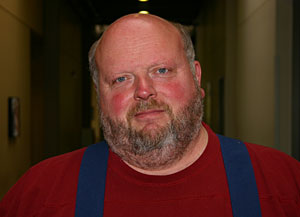This content was published: April 12, 2006. Phone numbers, email addresses, and other information may have changed.
Dwight Page helps students train in the trades
Photos and Story by James Hill
“I want to make sure students know what they are getting themselves into,” said Dwight Page.
Page, a trade extension instructor, is very clear about that when you begin the conversation about apprenticeship programs. He is equally clear about the opportunities, challenges and exciting futures he places before students each day as part of the Trades and Apprenticeship programs he coordinates at the Cascade Campus of Portland Community College.
Page’s programs are designed to create a new wave of trained trades-people, skilled, well-paid women and men working with their hands in jobs across the region. His students spend at least one day a week visiting the apprenticeship programs around the region looking at construction sites, sheet metal, plumbers and fitters, painters and finishers, and electrical linemen tasks.
Many of these experiences are specially designed to train students to take on jobs with the Oregon Department of Transportation including heavy equipment operation, cement masons, laborers, carpenters, and iron workers. Students get to understand first hand the work and then they research the discipline required to be successful. The payoffs in terms of salary, benefits and security help to balance the message.
It is a balance of which Page is well aware. His own journey to his present position included apprenticeships, teaching, and administering electrical training programs. It also included work in the field as a foreman, project manager, project engineer and division manager for Christensen Electric and other firms.
The electrical trades are his expertise, but he works with his students to help them find their passion, “what will get them up each day. We need to get the students and sometimes the parents, to understand the opportunities available in the trades. Not all students are set to become doctors and lawyers. In fact most could find an avenue of success in the trades.”
“There is no simple journey to journeyman,” according to Page. The apprenticeship programs invest heavily in developing skilled workers able to do the work well now and flexible enough to handle the changing technology. Page wants his students ready to take on the apprenticeship programs. That means getting them ready for the stringent tests required by the state: “If you can get a license in Oregon, you can work in just about any place in the world.”
“It is worth it,” Page says, and not just because the salaries can double in just a few years. “Starting,” he says, “at $12 to $15 per hour to more than $30 per hour in four to five years- with health and other benefits.”
One example: It is not uncommon for electrical linemen to make over $100,000 per year repairing storm damaged regions.
He tells a story about a Job Fair where a well dressed visitor in a business suit stopped by his booth to see what kinds of jobs were available. The older man began to get upset. When asked why, he told Page that, although he loved working with his hands, he had been told throughout his life that to be successful he had to be a lawyer. He became a successful lawyer, but was now upset because he didn’t recognize what the possibilities really had been for him.
Page believes he is opening the world of possibilities to his students and, at the same time, making sure they understand the realities of the work ahead of them.
He says, “You’re not going to impress them with glitz and fluff. They are going to have to see results.”
Page has high expectations of great results. His students seem to be living up to those expectations. They are on the path to jobs in the area in construction, heavy equipment and electrical trades: trained well for jobs that pay well.
